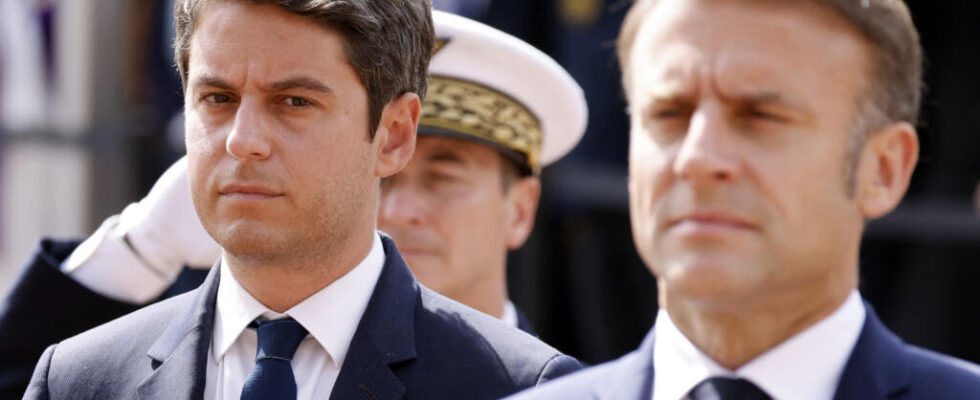The day after the second round of early legislative elections, the head of government saw his resignation refused by the president. Gabriel Attal therefore remains Prime Minister. For now “But how long can this situation last?
3 min
In refusing the resignation of the Prime Minister Monday July 8, Emmanuel Macron is trying to gain time. In accordance with Article 8 of the Constitution, the President of the Republic alone has the power to appoint and dismiss the head of government. He also chooses who he wants, when he wants. If we stick to the letter, this situation can therefore last as long as the President wishes.
Read alsoMeyer Habib, François Hollande, Emmanuel Tjibaou: resounding victories and defeats in the French legislative elections
However, Emmanuel Macron faces several constraints. First, if his camp resisted the early legislative elections better than expected (around 160 seats), it no longer represents the leading force in the National Assembly. The tenant of the Élysée therefore finds himself under pressure from the left, which claims the right to propose, as a priority, a Prime Minister based on the implacable observation that the New Popular Front has the largest contingent of deputies with a very relative majority of around 190 elected representatives, very far from the 289 necessary for an absolute majority. But here again, nothing obliges the president to retain a member of the first group of the Assembly to lead the government.
Impossible coalitions, very relative majority
On the evening of the second round, Emmanuel Macron also declared that he wanted to wait for a ” structuring ” of the new Assembly. And this is where the second constraint comes in: the calendar. The head of state intends to observe the composition of the groups here. The deputies elected or re-elected last Sunday have until July 18, the date imposed by the Constitution, to choose the group in which they want to sit. Once the groups are established and distributed, this will make it possible to more precisely identify those who could potentially participate in a grand coalition capable of governing.
Some in the Macronist camp want to exclude forces like France Insoumise and the National Rally to form a sort of large republican majority. Finding such a ” relative majority coalition ” on ” important items such as purchasing power and security ” that ” will take several weeks “, said the Renaissance MP for Paris, Sylvain Maillard, on Monday. It is above all a ” sweet dream “, asserted in return the leader of the Republican senators Bruno Retailleau, asking: “ Do you honestly see me governing with François Hollande? ? ».
On the left, deputies elected without the NFP label would be ready for this perspective and to join the socialist group if it breaks with LFI. Others, still on the left, believe that the New Popular Front (including LFI) must govern. Discussions are underway to propose a name for Prime Minister to the president in the coming days. We must not allow a form of vacuum to arise into which the head of state would rush. “, insisted the leader of the PS, Olivier Faure. Emmanuel Macron will obviously not be obliged to accept the proposed name.
July 18th, deadline
However, from July 18, the new Assembly will sit. Its priority will be to elect the president of the National Assembly, then its vice-presidents, the committee presidents and the members of the quaestorship. Once all these people are installed, motions of censure can be filed and therefore the government of Gabriel Attal potentially overthrown. It can nevertheless be saved if no absolute majority (289 deputies) votes for the fall of the government. In this case, the Attal government would hold and this would free up time to allow a grand coalition to emerge.
Read also[Vos questions] All your questions about the results of the legislative elections in France
During this period, the duration of which is not defined by the Constitution, the government will nevertheless be very limited in its scope of action. Its main mission will be to ensure the continuity of the State.
